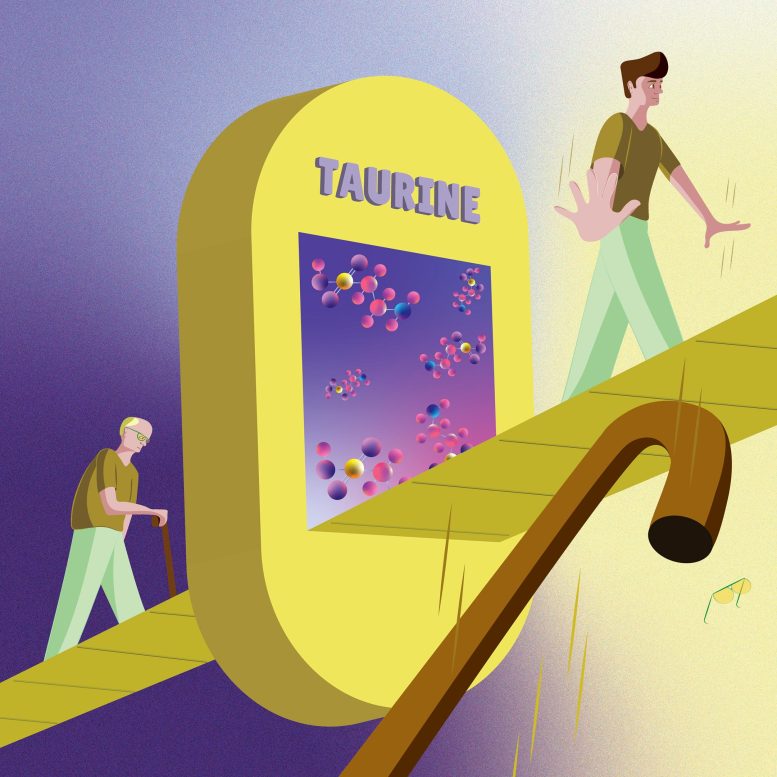
Taurine supplementation increases healthy life span. In the illustration an old man is seen walking through a taurine shower and coming out as rejuvenated healthy man. Taurine structure is depicted as a ball and stick model in the taurine shower. Credit: Columbia University Irving Medical Center
Research indicates taurine deficiency may contribute to aging, and supplementation could improve longevity and health. In animal models, including mice and monkeys, restoration of taurine levels increased lifespan and slowed aging markers. However, further human trials are necessary to validate these potential anti-aging effects of taurine.
Introduction to Taurine’s Role in Aging
Taurine deficiency may be a driver for aging, according to a new study. This study evaluated the amino acid’s effect on health and longevity across several animal models. According to the authors, reversing age-associated taurine loss through supplementation improved the healthy lifespan in worms, rodents, and non-human primates. These findings warrant further human trials to examine taurine’s effect on healthy lifespan in humans and to understand the potential risks involved.
Taurine is a common ingredient in energy drinks, such as the brands Red Bull, Monster Energy, Rockstar, NOS, Full Throttle, and AMP. For those seeking to bypass the caffeine and other ingredients typically found in energy drinks, taurine supplements offer a straightforward way to obtain the nutrient.
Previous Studies and Limitations
Taurine, a semi-essential micronutrient, is one of the most abundant amino acids in animals. Previous studies in several species have shown that taurine deficiency during early life causes functional impairments in skeletal muscle, eyes, and the nervous system, all in ways that are related to aging-associated disorders. Small clinical trials of taurine supplementation have suggested benefits in metabolic and inflammatory diseases, but the influence of taurine concentrations on animal health and longevity remains poorly understood.
Current Study Findings
To better understand if and how taurine abundance influences a healthy lifespan, Parminder Singh and colleagues measured blood taurine concentrations at different ages in mice, monkeys, and humans. They discovered that in 15-year-old monkeys, serum taurine concentrations were 85% lower than in 5-year-old monkeys. Similarly, taurine levels decreased by more than 80% over the human lifespan. Declining taurine levels were also observed in aging mice and the authors found that mice lacking the major taurine transporter had shorter adult lifespans.
Effects of Taurine Supplementation
Reversal of this decline through taurine supplementation increased the median lifespan of worms and mice by 10 to 23% and 10 to 12%, respectively. Notably, in mice, orally administered taurine at 500 and 1000 milligrams per kilogram body weight per day was also associated with improvements in strength, coordination, and cognitive functions and slowed several key markers of aging, including cellular senescence, mitochondrial and DNA damage, and inflammageing. Furthermore, taurine supplementation in middle-aged rhesus macaques positively affected bone, metabolic, and immunological health.
Future Considerations and Potential Risks
Although the authors note that reversal of taurine deficiency during aging shows potential to be a promising anti-aging strategy, further research and human clinical trials are needed to see if taurine supplementation increases the healthy lifespan in humans. In a perspective provided by Joseph McGaunn and Joseph Baur, they note that while few risks to taurine supplementation have been suggested, the potential for risks still warrants consideration because large, long-term human safety trials are lacking. The equivalent doses used in the Singh et al. study would be very high in humans. As such, taurine supplementation with the aim of improving human health and longevity should be approached with caution.
For more on this study, see Energy Drink Ingredient Taurine May Boost Healthy Lifespan.
Reference: “Taurine deficiency as a driver of aging” by Parminder Singh, Kishore Gollapalli, Stefano Mangiola, Daniela Schranner, Mohd Aslam Yusuf, Manish Chamoli, Sting L. Shi, Bruno Lopes Bastos, Tripti Nair, Annett Riermeier, Elena M. Vayndorf, Judy Z. Wu, Aishwarya Nilakhe, Christina Q. Nguyen, Michael Muir, Michael G. Kiflezghil, Anna Foulger, Alex Junker, Jack Devine, Kunal Sharan, Shankar J. Chinta, Swati Rajput, Anand Rane, Philipp Baumert, Martin Schönfelder, Francescopaolo lavarone, Giorgia di Lorenzo, Swati Kumari, Alka Gupta, Rajesh Sarkar, Costerwell Khyriem, Amanpreet S. Chawla, Ankur Sharma, Nazan Sarper, Naibedya Chattopadhyay, Bichitra K. Biswal, Carmine Settembre, Perumal Nagarajan, Kimara L. Targoff, Martin Picard, Sarika Gupta, Vidya Velagapudi, Anthony T. Papenfuss, Alaattin Kaya, Miguel Godinho Ferreiral, Brian K. Kennedy, Julie K. Andersen, Gordon J. Lithgow, Abdullah Mahmood Ali, Arnab Mukhopadhyay, Aarno Palotie, Gabi Kastenmiller, Matt Kaeberlein, Henning Wackerhage, Bhupinder Pal and Vijay K. Yadav, 9 June 2023, Science.
DOI: 10.1126/science.abn9257








Interesting news,would like to know more about taurine
I am very interested in learning more about this.
pPp~~~
Enjoy.